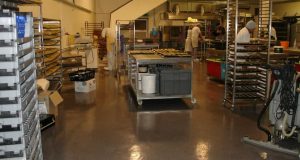From cake mix to bread dough, bakery flooring has been used in commercial and industrial bakeries for decades, providing a safe, sanitary surface that can easily withstand the hustle and bustle of busy operations. While standing up to heavy traffic, it also must be able to handle wet ingredients and occasional spills without becoming a safety hazard.

Many different types of bakery products on the market today-from baking pans to proofers-it’s important that you select the right type of flooring for your kitchen facility. From traditional linoleum tile and sheet vinyl to more contemporary epoxy coatings, there are options available for almost any style or size kitchen facility.
Types of Bakery Flooring
If you’re in the market for new bakery flooring, there are a few different types of bakery flooring.
Epoxy Flooring
The flooring has become a popular choice for bakery floors due to its durability and resistance to spills and stains. Epoxy flooring is known for durable and easy to clean.This flooring material is made from a combination of resin and hardener, creating a tough and seamless surface that is easy to clean and maintain.
The seamless design also enhances the hygiene of the bakery, as there are no grout lines for bacteria to build up in. The non-slip surface of epoxy flooring also provides safety for bakers and customers. This flooring choice not only adds an aesthetically pleasing look to the bakery, but also ensures a long-lasting and safe environment for everyone.
Polyurethane Resin Flooring
Polyurethane resin flooring is another viable choice for bakeries, primarily known for its flexibility and high resistance to impact, abrasion, and chemicals. This type of flooring is highly durable, making it a suitable selection for areas that experience heavy foot traffic or machinery use.
Polyurethane flooring is resistant to thermal shock, making it an ideal solution for bakeries that require sudden temperature changes, like those found between ovens and refrigeration units.
This flooring also provides a seamless and non-slip surface, greatly enhancing the safety and cleanliness of the bakery. Despite its robust nature, polyurethane resin flooring does not compromise on aesthetics, available in a wide variety of colors and finishes to suit the visual theme of any bakery.
Ceramic Tile
The other type is ceramic tile,it is a flooring option for bakeries that have become increasingly popular due to their durability and easy maintenance. Other flooring materials, such as hardwood or carpet, ceramic tiles are able to withstand high levels of moisture and heavy foot traffic. In a bakery, where spills and flour dust are common, having a non-porous surface like ceramic tiles is crucial for hygiene and safety reasons.
It may require more maintenance than other types of flooring, it can add a classic touch to any bakery. No matter which type of flooring you choose, it’s important to consider factors such as slip-resistance and ease of cleaning to ensure that your bakery is both safe and sanitary.
Benefits of Bakery Flooring
Besides being durable and easy to clean, bakery flooring also has other benefits that make it a top choice for commercial kitchens.
One of the main benefits is its ability to withstand high levels of moisture. In a bakery setting, where ingredients like water and flour are constantly being used, having a waterproof surface is essential.
Bakery flooring materials are designed to be non-porous, preventing bacteria and mold from growing and making it easier to maintain a clean and hygienic environment. This is especially important in food production facilities where cleanliness is critical for ensuring the safety of products.
The advantage of bakery flooring is its slip-resistant properties. With the potential for spills and wet ingredients on the floor, having a non-slip surface can prevent accidents and injuries among bakers and customers. This not only protects the well-being of individuals but also reduces potential liability for the bakery.
Considerations when choosing bakery flooring
When choosing bakery flooring, there are a few factors to consider in addition to durability and safety. One important consideration is the type of baking that will be done in the facility.
Hygienic
Hygiene is an essential factor when selecting flooring for a bakery. The floor should be easy to clean, able to resist bacterial and fungal growth, and not be subject to degradation by cleaning chemicals. Epoxy and ceramic flooring, for example, are non-porous materials that don’t harbor bacteria, making them excellent choices for maintaining cleanliness standards.
Regular and proper cleaning routines should be established to ensure that the flooring remains hygienic over its lifetime. The importance of hygiene in a bakery cannot be overstated, as it directly impacts the quality and safety of the food products being made. Therefore, choosing a bakery floor that enables easy, effective cleaning is a vital decision in creating a healthy, efficient baking environment.
Ease Of Cleaning & Anti Slip
Bakery flooring must be easy to clean and possess anti-slip properties to ensure a safe and efficient working environment. An easy-to-clean floor minimizes the chance of bacterial growth, contributing to the overall hygiene of the bakery. It also reduces the time and labor spent on daily cleaning routines.
Anti-slip properties are crucial in preventing accidents that could lead to injury or contamination of bakery products. Safety should always be a priority in any food production facility, and the choice of flooring plays a significant role in this.
Flooring materials like epoxy and ceramic tiles, with their seamless design and non-porous surface, offer both easy cleaning and slip resistance, making them an optimal choice for bakeries. The right flooring choice can greatly enhance the productivity, safety, and efficiency of a bakery.
Durability
Durability is a key consideration when selecting flooring for a bakery. The floor must withstand heavy foot traffic, machinery usage, frequent cleaning, and the occasional drop of heavy baking equipment or materials. Long-lasting and resilient flooring options, such as epoxy, polyurethane resin, and ceramic tiles, are capable of withstanding these pressures without showing signs of wear and tear.
These materials are robust enough to resist cracks, chips, and other damage that could potentially harbor bacteria and compromise hygiene. A durable bakery floor is not just an investment in the immediate functionality of the space, but also in the long-term efficiency and profitability of the bakery. Therefore, selecting a strong, durable floor material is instrumental in ensuring the bakery’s operation is unimpeded by frequent floor repairs or replacements.
Conclusion
Choosing the right type of flooring can greatly impact the cleanliness, safety, and overall functionality of the bakery. Slip-resistant and easy-to-clean flooring materials, such as ceramic, quarry, or epoxy flooring, are often recommended. It is important to consider factors such as moisture levels, durability, and cost when selecting bakery flooring. Investing in high-quality bakery flooring will not only enhance the appearance and productivity of a bakery, but also promote a safe and sanitary environment for both employees and customers.
FAQs
Is epoxy flooring a good choice for a bakery?
Yes, epoxy flooring is a durable and easy-to-clean option for bakeries. Its non-slip surface and seamless design make it ideal for maintaining hygiene in the facility.
What are some other options for bakery flooring?
Some popular options include vinyl tiles, ceramic tiles, and hardwood floors.
What is the best type of flooring for a bakery?
It ultimately depends on the specific needs and preferences of the bakery, but some popular options include epoxy flooring, vinyl tiles, and ceramic tiles.
Is it important to have non-slip flooring in a bakery?
Yes, having non-slip flooring is crucial for safety purposes as spills and wet ingredients can cause accidents. It also helps to prevent potential liability for the bakery.
Are there any tips for maintaining a clean and hygienic bakery floor?
Yes, investing in good-quality mats, sweeping regularly, and using suitable cleaning agents are all helpful tips for keeping a bakery floor clean and hygienic.
